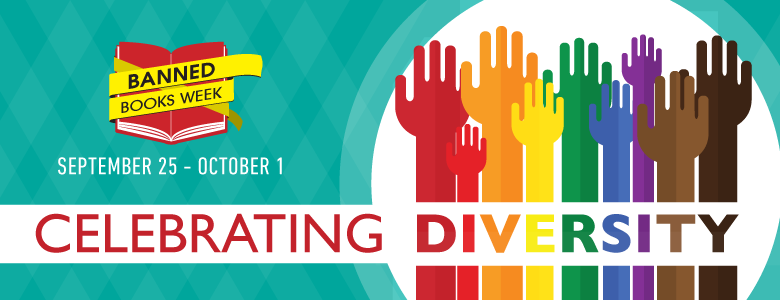In honor of Banned Books Week 2016, the Lantern Review Blog has solicited a list of recommended reading from its friends, former staff, and past contributors. These are titles that our community has identified as works too important not to be read; that is, books that ought to be defended, rather than challenged and/or removed from bookstores, libraries, and classrooms. Join us and the rest of the book community as we celebrate the right to express and to seek ideas through literature. And don’t forget to leave a comment below, if you’d like to contribute to this list of books that you believe we deserve the freedom to read!
* * *
Corona by Bushra Rehman (Sibling Rivalry Press, 2013)
“Corona is a dark comedy featuring Razia Mirza, a young Pakistani woman from Queens, NYC. When a rebellious streak leads to her excommunication from her Muslim community, she decides to go on the road, but it doesn’t take her long to realize traveling as a Muslim woman is quite different than traveling as Jack Kerouac.” —Bushra Rehman
culebra by Roberto Harrison (Green Lantern Press, 2016)
“Roberto Harrison’s tercets investigate, uncover, the ways in which a landscape, a history can embody the mythos of an animal. In this case, the snake: ‘The Kuna Indians of Panama make their molas in pairs. According to this tradition, things arrive in the world in pairs, so as to create a third from the union. As we are limited in our binary thinking, the snake points away toward the integral through a triad, toward a more whole understanding of the world. It knows the silence of death in the ground of the living. It heals as it sees with his tongue and symbolizes an alternative way of knowing.’ ” —Mg Roberts
Johnny Got His Gun by Dalton Trumbo (Bantam Books, 1984)
“Set in the aftermath of World War I, Johnny Got His Gun is a scathing commentary on the realities of war and raises troubling questions about taking extraordinary measures to prolong life when someone does not wish to live. The main character, Joe Bonham, lives as a prisoner in his own body, having lost his arms, legs, and all of his face after being caught in the blast of an artillery shell.” —Kathleen Hellen
Lettres philosophiques (1734) by Voltaire (University of Oxford, 2017)
“This book of twenty-five letters by Voltaire has been translated as Letters on England (Penguin Classics) and Letters Concerning the English Nation (Oxford World’s Classics), among other editions. My favorite letters are the ones about Newton and Descartes, British tragedy, and Pascal’s Pensées.” —Fiona Sze-Lorrain
Opening Up: A Guide to Creating and Sustaining Open Relationships by Tristan Taormino (Cleis Press, 2008)
“Opening Up is an excellent introduction to polyamory, the practice of having multiple romantic relationships at the same time with the knowledge and consent of all involved. The percentage of people who practice some form of ethical non-monogamy has been growing rapidly in recent years and polyamory has been called a lifestyle choice, a sexual orientation, and a relationship orientation.” —Clara Changxin Fang
Pinoy Poetics: A Collection of Autobiographical and Critical Essays on Filipino and Filipino American Poetics Edited by Nick Carbo (Meritage Press, 2004)
“Pinoy Poetics was long overdue when it was released in 2004. A collection of autobiographical poetics by Filipino and Filipino American authors, it remains fresh today. Even as many of the book’s poets since has received major awards, Pinoy Poetics remains unique in representing the concerns and interests of Filipin@ poets, which are often reduced or elided in categories like ‘Asian American,’ ‘poets of color,’ et al.” —Eileen R. Tabios
The Argonauts by Maggie Nelson (Graywolf Press, 2015)
“I wish I’d had a wise aunt like Maggie Nelson to talk to when I was growing up, or this book. I’ve read few better meditations on love: and death, and pregnancy, friendship, motherhood, birth, family, gender, the pain of losing love, loving a parent who’s dying, love and sex, loving anal sex… The first paragraph will make people want to ban this book. And it gets better after that so we need to protect it.” —JoAnn Balingit
The Butcher’s Wife by Li Ang (Peter Owen Publishers, 2002)
“Set in a Taiwanese village in the 1930’s, this is a harrowing morality tale of violence and patriarchy. It’s the most frightening, gory book on the oppression of women I’ve ever read.” —Joseph O. Legaspi
When the Chant Comes by Kay Ulanday Barrett (Topside Press, 2016)
“When the Chant Comes is a love song for all the ‘queer hungry parched kids,’ for those who gather in many tongues, for those whose bodies hold memory across ocean and scar, for those who desire and deserve rest and dream.” —Ching-In Chen
